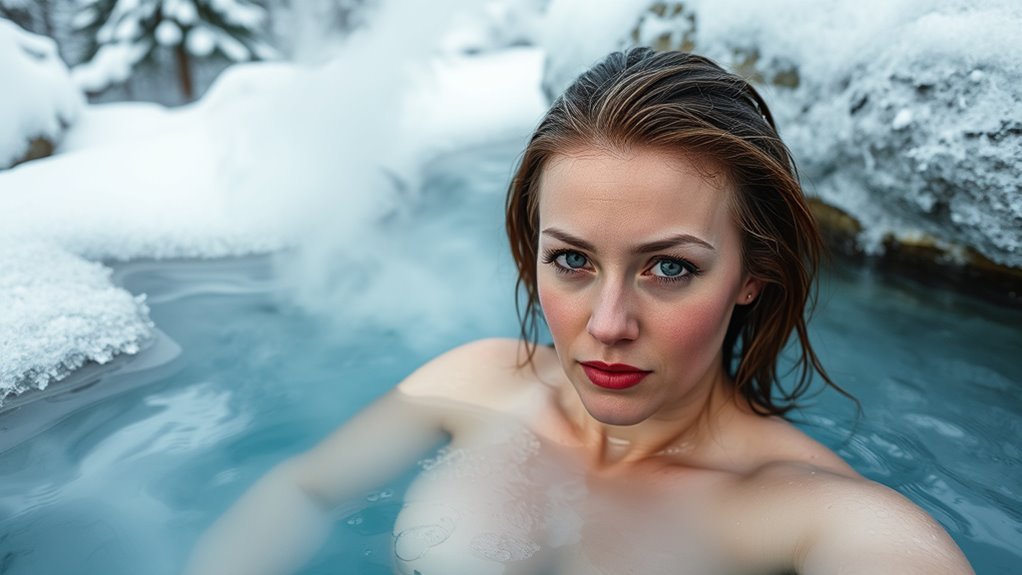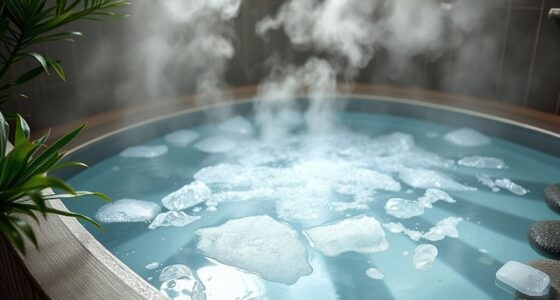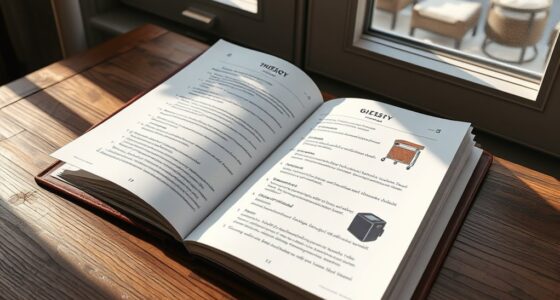When you take a cold plunge, your body responds by releasing hormones like adrenaline and norepinephrine, which help boost your physical recovery and mental resilience. Adrenaline sharpens your senses and triggers the fight-or-flight response, while norepinephrine improves your mood and focus. These hormonal shifts reduce inflammation and promote tissue repair, helping you recover faster and handle stress better. Keep exploring to discover how these responses can transform your overall well-being.
Key Takeaways
- Cold plunges trigger a surge in adrenaline (epinephrine), activating the body’s fight-or-flight response.
- Norepinephrine levels increase during cold exposure, helping regulate inflammation and promote muscle recovery.
- Elevated adrenaline and norepinephrine enhance mental alertness, mood, and concentration.
- Regular cold exposure improves the efficiency of hormonal release, strengthening stress resilience and mental toughness.
- These hormonal responses contribute to overall well-being by balancing nervous system activity and reducing fatigue.

Cold plunges are gaining popularity not just for their invigorating effects but also for their impact on their hormonal responses. When you immerse yourself in cold water, your body reacts by activating a complex hormonal cascade that influences both physical performance and mental health. For athletes, these benefits are especially significant. Cold plunges can help reduce inflammation and muscle soreness after intense workouts, allowing you to recover faster and train more effectively. This accelerated recovery is partly due to the hormonal shifts that occur during cold exposure, which help regulate inflammation and support tissue repair. Additionally, the surge of hormones like adrenaline and norepinephrine during cold plunges boosts alertness and focus, giving you a mental edge for your next session or competition.
Your body’s response to cold immersion isn’t just about physical recovery; it also has profound effects on your mental health. The release of adrenaline, also known as epinephrine, triggers your body’s fight-or-flight response, sharpening your senses and increasing energy levels. This heightened state can make you feel more alert and motivated, helping you combat feelings of fatigue or depression. Norepinephrine, a close cousin of adrenaline, plays a *fundamental* role here. It acts as a neurotransmitter that enhances mood and concentration, which explains why many people report feeling more centered and positive after cold plunges. These hormonal responses can reduce stress levels by balancing your nervous system, leading to improved mental clarity and emotional resilience. Moreover, engaging in regular cold exposure can support hormonal balance, which is essential for overall well-being.
Furthermore, regular cold plunges can help you develop a stronger stress response system. Over time, your body adapts to the shock of cold exposure, becoming more efficient at releasing adrenaline and norepinephrine when needed. This adaptation not only boosts your physical resilience but also promotes mental toughness. You might notice that you’re better equipped to handle stressful situations outside the water, thanks to these hormonal shifts. For athletes, this translates into improved performance under pressure, greater focus during competitions, and a quicker recovery from mental fatigue.
Frequently Asked Questions
How Long Should a Cold Plunge Last for Optimal Hormonal Benefits?
You should aim for a cold plunge lasting about 3 to 5 minutes for ideal hormone regulation. Staying in too long can trigger a cold shock response, which may reduce benefits and cause discomfort. Keep the duration manageable, allowing your body to adapt without overstressing it. This length encourages a healthy release of adrenaline and norepinephrine, helping to boost mood, alertness, and overall hormonal balance effectively.
Do Cold Plunges Affect Long-Term Hormonal Balance?
Cold plunges can positively influence your long-term hormonal balance by promoting hormonal adaptation and stress modulation. Regular exposure helps your body become more resilient to stress, balancing hormones like cortisol and adrenaline. Over time, this practice supports improved mood, energy, and overall hormonal health. However, consistency is key, and overdoing it might cause hormonal disruptions, so listen to your body and incorporate cold plunges gradually for lasting benefits.
Can Cold Exposure Improve Mental Health Through Hormonal Changes?
Imagine opening a secret door to better mental health—cold exposure can do just that. It triggers hormonal changes like adrenaline and norepinephrine, which promote stress reduction and mood enhancement. By regularly exposing yourself to cold, you activate your body’s natural response, helping to stabilize mood and reduce anxiety over time. So yes, cold plunges can greatly improve mental well-being through these powerful hormonal shifts.
Are There Age Restrictions for Safely Performing Cold Plunges?
Age restrictions for cold plunges vary, but safety concerns are key. If you’re under 18 or over 65, you should consult a healthcare professional before trying it. Younger and older individuals may have different risks like cardiovascular issues or reduced thermoregulation. Always listen to your body, start gradually, and guarantee proper supervision and safety measures in place. Prioritizing safety helps you enjoy the benefits without unnecessary risks.
How Quickly Do Hormonal Responses Occur After Cold Immersion?
Imagine flipping a switch—you feel the adrenaline surge within seconds of cold immersion. Hormonal timing is rapid; your body reacts almost instantly. When you plunge into cold water, your adrenal glands kick into gear, releasing adrenaline and norepinephrine within moments. This quick response boosts alertness and energy, showing how your body’s hormonal responses are almost immediate, helping you adapt and survive in chilly environments.
Conclusion
As you take cold plunges, you activate adrenaline and norepinephrine, fueling your energy, sharpening your focus, and boosting your mood. You embrace the chill to awaken your body, challenge your mind, and enhance your resilience. You harness the power of nature’s cold, harness the power of your response, and unleash your potential. You step into the cold, and in turn, you step into a stronger, more vibrant version of yourself.









